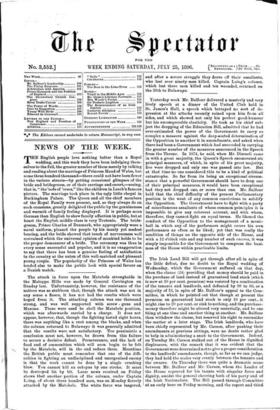Yesterday week Mr. Balfour delivered a masterly and very lively
speech at a dinner of the United Club held in St. James's Hall, a speech which betrayed no sort of de- pression at the attacks recently rained upon him from all sides, and which showed not only his perfect good-humour but his unconquerable elasticity. He took as his chief sub- ject the dropping of the Education Bill, admitted that be had over-estimated the power of the Government to carry so complex a measure against the deep-seated determination of the Opposition to smother it in amendments, and asked when there had been a Government which had succeeded in carrying the greater number of the measures announced in the Speech from the Throne. In 1874, he said, when Mr. Disraeli came in with a great majority, the Queen's Speech enumerated six principal measures, of which, in spite of his great majority, five were dropped and only one was passed into law. But at that time no one considered this to be a kind of political catastrophe. So far from its being an exceptional circum- stance that a powerful Government should have to drop one of their principal measures, it would have been exceptional had they not dropped one, or more than one. Mr. Balfour held that the chief difficulty of the present Parliamentary position is the want of any common convictions to solidify the Opposition. The Government have to fight with a party of miscellaneous assailants of whose common principles it is impossible to give any coherent account, and with whom, therefore, they cannot fight on equal terms. He likened the conduct of the Opposition to the management of a music- hall in which any of the performers might encore his own performance as often as he liked; yet that was really the condition of things on the opposite side of the House, and with a 12 o'clock rule and any number of such encores, it was simply impossible for the Government to compress the busi- ness of the House within practicable limits.


































